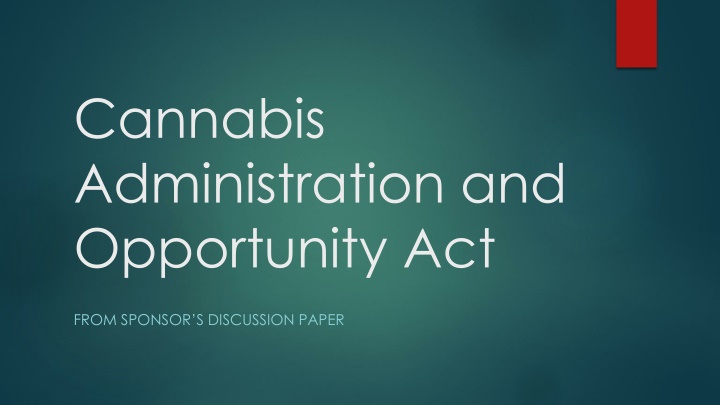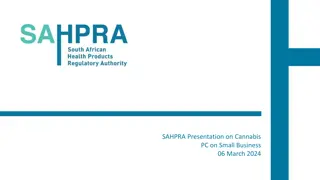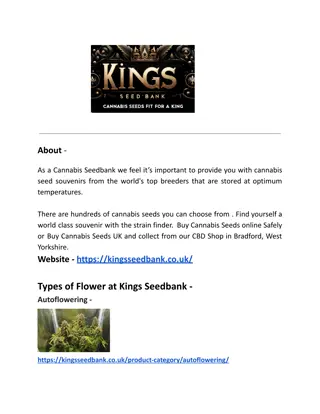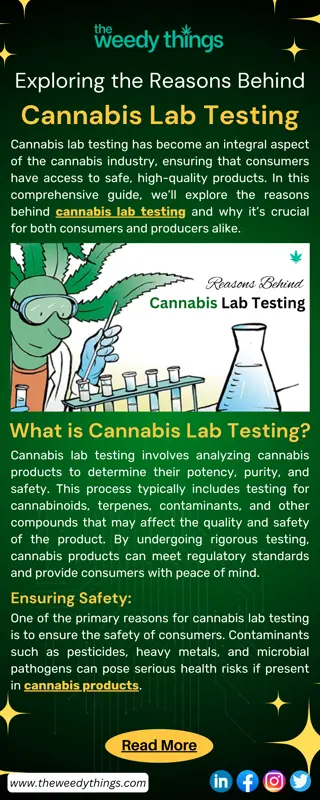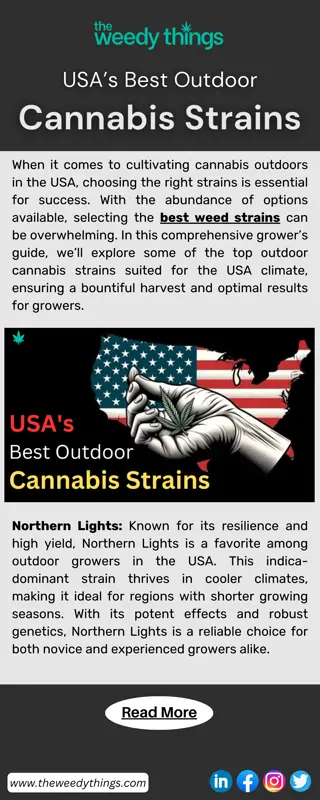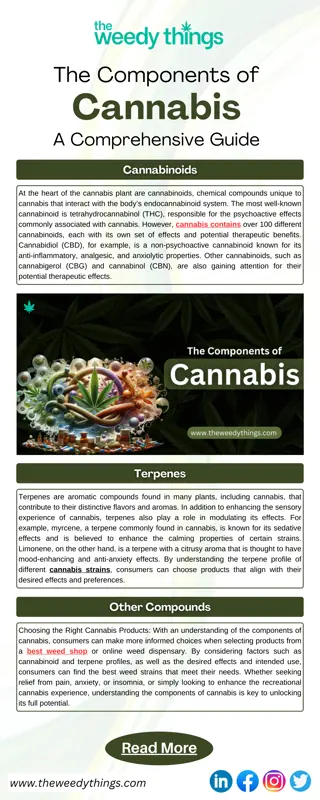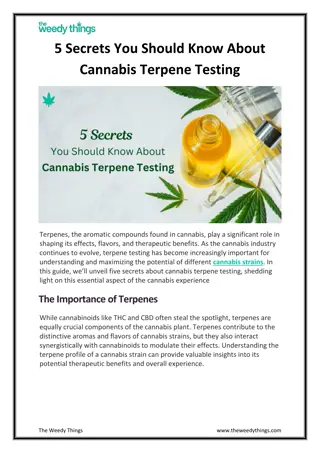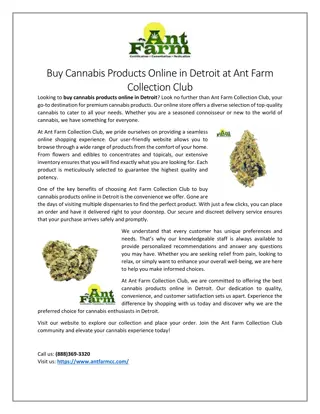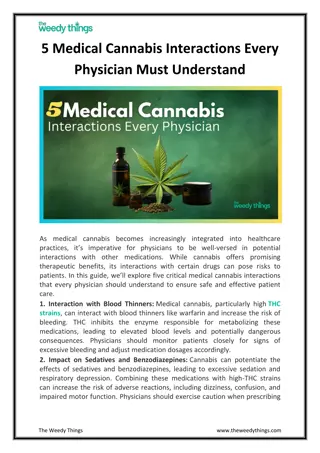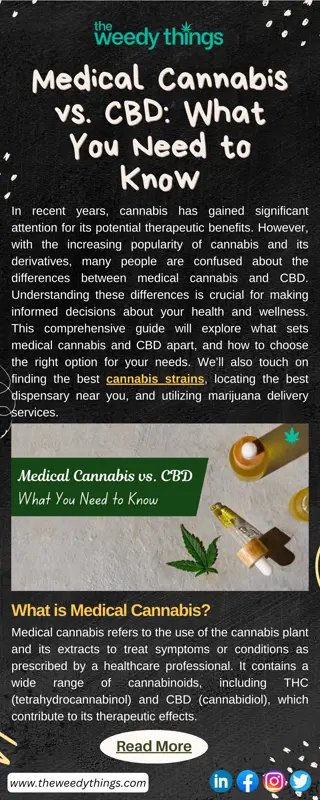Cannabis Administration & Opportunity Act Overview
The Cannabis Administration & Opportunity Act, sponsored by Booker, Wyden, and Schumer, aims to decriminalize and deschedule cannabis, reinvest in those impacted by the War on Drugs, provide expungement for cannabis offenses, and transfer regulatory authority from the DEA to FDA, TTB, and ATF. The legislation would redefine cannabis, remove it from the Controlled Substances Act, and establish new regulatory frameworks. Stakeholders are invited to provide feedback on the proposed changes.
Download Presentation

Please find below an Image/Link to download the presentation.
The content on the website is provided AS IS for your information and personal use only. It may not be sold, licensed, or shared on other websites without obtaining consent from the author.If you encounter any issues during the download, it is possible that the publisher has removed the file from their server.
You are allowed to download the files provided on this website for personal or commercial use, subject to the condition that they are used lawfully. All files are the property of their respective owners.
The content on the website is provided AS IS for your information and personal use only. It may not be sold, licensed, or shared on other websites without obtaining consent from the author.
E N D
Presentation Transcript
Cannabis Administration and Opportunity Act FROM SPONSOR S DISCUSSION PAPER
Cannabis Administration & Opportunity Act Senate Bill Discussion Draft Sponsors, Booker, Wyden, Schumer Long Title: To decriminalize and deschedule cannabis, to provide for reinvestment in certain persons adversely impacted by the War on Drugs, to provide for expungement of certain cannabis offenses, and for other purposes
Cannabis Administration & Opportunity Act Only 2 overall Definitions Cannabis -- The term cannabis has the same meaning given such term in subsection (ss) of section 201 of the Federal Food, Drug, and Cosmetic Act (21 U.S.C. 321) (as added by section 502 of this Act). Cannabis Offense -- means a criminal offense related to cannabis (A) that, under Federal law, is no longer punishable pursuant to this Act or the amendments made under this Act; or (B) that, under State law, is no longer an offense or that was designated a lesser offense or for which the penalty was reduced under State law pursuant to or following the adoption of a State law authorizing the sale or use of cannabis Cannabis products defined in the section addressing the FDA
Cannabis Administration & Opportunity Act Title One Decriminalization Title One would remove cannabis (marihuana) from the Controlled Substances Act and direct the Attorney General to remove cannabis from the list of controlled substances in regulation within 60 days of enactment of CAOA A new definition of cannabis would be established within the Federal Food Drug and Cosmetic Act (FFDCA) under title 21 of the U.S. Code, which establishes requirements for food, dietary supplements, drugs (including biologics), devices, cosmetics, and other substances such as tobacco. This definition would retain the existing exception for hemp.
Cannabis Administration & Opportunity Act Title One also transfers primary agency jurisdiction over cannabis from the DEA to the FDA within the Department of Health and Human Services, TTB within the Treasury Department, and ATF, within the Department of Justice, as appropriate. transfer of jurisdiction would generally follow similar agency responsibilities established for alcohol and tobacco
Cannabis Administration & Opportunity Act The Sponsoring Offices request comments on the new definition of cannabis, including comments on The appropriate way to measure the potency of cannabis and cannabis products; The interaction between the definition of cannabis and the definition of hemp; The interaction between the definition of cannabis, cannabis product, and FFDCA drugs containing cannabis; The appropriate classification and regulation of synthetically-derived THC; and Conforming amendments and interactions relating to the descheduling of cannabis and establishing a new definition outside of the Controlled Substances Act.
Cannabis Administration & Opportunity Act The Sponsoring Offices also request comments on agency responsibilities, including The appropriate division of responsibilities between FDA, TTB, and ATF, including ways to increase coordination between agencies and ways to reduce duplication of administrative and compliance burdens; Appropriations requests for various agencies involved in cannabis administration in order to ensure that those agencies have the necessary tools and resources to effectively carry out new responsibilities; and Whether FDA regulation of cannabis products should be funded through a user fee program or other funding model.
Cannabis Administration & Opportunity Act Recognition of State Law Controlling Cannabis, Establishment of Public Safety and Enforcement. Sec. 111 recognizes state law as controlling the possession, production, or distribution of cannabis. Notwithstanding federal decriminalization, shipment of cannabis into a state in violation of state law is prohibited. In addition, the provision retains criminal penalties in the case of illegal cannabis diversion. Cannabis diversion is defined as (1) the unlawful possession, production, distribution, or purchase of 10 pounds or more of cannabis in violation of federal or state law, or (2) the unauthorized possession of 10 pounds or more of cannabis in any state or local jurisdiction for which tax has not been paid in accordance with local law. The provision clarifies that a state may not prohibit the interstate commerce of cannabis transported through its borders for lawful delivery into another state.
Cannabis Administration & Opportunity Act The Sponsoring Offices request comments on states rights and anti- diversion provisions, including the appropriate quantitative thresholds regarding contraband cannabis; The appropriate penalties for violations of anti-diversion provisions; Effective coordination between federal and state law enforcement and tax administrators relating to diverted cannabis; The interaction between state primacy regarding cannabis regulation, and the need for interstate consistency for product standards and regulation, including any responsibilities that should be reserved explicitly for states or the federal government; and Rules relating to interstate commerce involving cannabis, including state-level taxation and interactions with state-level distribution systems.
Cannabis Administration & Opportunity Act Establishing Minimum Age, Restriction on Retail Sale Sec. 502(b) of the Discussion Draft would establish 21 years of age as the minimum age required to purchase cannabis. A related provision would limit any retail sales transaction to no more than 10 ounces of cannabis or the equivalent amount of any cannabis derivative. intended to prevent illegal actors from purchasing large quantities of cannabis at retail in a cannabis-legal state and illegally trafficking that cannabis into other states
Cannabis Administration & Opportunity Act The Sponsoring Offices request comment on the retail sale age and quantity restrictions, including Whether additional programs or resources are needed to aid states in enforcing a minimum age requirement or quantitative retail limitations, The interaction between state minimum age laws and use of medication containing cannabis by minors, Guidance on existing best practices by cannabis-legal states regarding minimum age enforcement, The interaction between state minimum age laws and limitations regarding non face-to-face transactions (discussed further in Sec. 501 of the draft), and The appropriate quantitative thresholds regarding the limit on retail sales of cannabis.
Cannabis Administration & Opportunity Act Research, Training, and Prevention Sec. 201 Directs the Comptroller General to conduct an evaluation of the societal impact of legalization by states with adult-use of cannabis, including . traffic-related deaths and injuries, hospitalizations and poison control center calls, violent crime rates, employment statistics, and rates of cannabis use, and various other criteria. Sec. 202 Directs Department of Health and Human Services (HHS) to conduct or support research on the impacts of cannabis, including the effects of cannabis on the human brain, the impact on various health conditions, and identification of potential medical benefits and uses of cannabis.
Cannabis Administration & Opportunity Act Research, Training, and Prevention Sec. 203 Directs the Department of Transportation and HHS to collect data on cannabis-impaired driving and continue research to enable the development of an impairment standard for driving under the influence of cannabis. Sec. 202 Directs Department of Health and Human Services (HHS) to conduct or support research on the impacts of cannabis, including the effects of cannabis on the human brain, the impact on various health conditions, and identification of potential medical benefits and uses of cannabis.
Cannabis Administration & Opportunity Act The Sponsoring Offices request comment on The annual and long-term funding needs for such efforts; Whether programs can be designed to steer research dollars to Historically Black Colleges and Universities and other institutions associated with historically disadvantaged communities; and Additional areas that may benefit from research, including agriculture, environmental protection, worker health and safety, and other areas.
Cannabis Administration & Opportunity Act Social Equity and Small Business Administration Sec. 301 of the Discussion Draft creates three grant programs Community Reinvestment, administered by a new Cannabis Justice Office in the Department of Justice Funding to eligible states and localities to make loans to assist small businesses in the cannabis industry owned by socially and economically disadvantaged individuals The Equitable Licensing Grant Program will provide funding to eligible states and localities to implement cannabis licensing programs that minimize barriers for individuals adversely affected by the War on Drugs. To receive funds, states and localities must take steps to create an automatic process to expunge criminal records for cannabis offenses and violations for individuals under criminal supervision for cannabis offenses
Cannabis Administration & Opportunity Act Social Equity and Small Business Administration Sec. 302 renames the existing Comprehensive Opioid Abuse Grant Program, the Comprehensive Opioid, Stimulant, and Substance Abuse Program. It amends the relevant sections of the Omnibus Crime Control and Safe Streets Act to make grants available to states and localities to address substance abuse generally, rather than just opioid abuse. Sec. 303 amends relevant sections of the Small Business Act and Small Business Investment Act to explicitly make SBA programs and services available to cannabis-related legitimate businesses and service providers.
Cannabis Administration & Opportunity Act The Sponsoring Offices request comment on similar and additional Opportunity Trust Fund programs, including Expansions to include SBA technical assistance and loans to socially and economically disadvantaged business owners outside of the cannabis industry; and Grants to certain business owners to offset administrative and compliance costs associated with the provisions of this Act.
Cannabis Administration & Opportunity Act Demographic Data of Cannabis Business Owners and Employees Sec. 304 of the Discussion Draft provides that the Bureau of Labor Statistics shall regularly compile and publicize data on the demographics (e.g., age, race, educational attainment) of business owners and employees in the cannabis industry. The Discussion Draft requires that identifying information shall be kept confidential.
Cannabis Administration & Opportunity Act Resentencing and Expungement Within one year of enactment, each federal district shall expunge any arrests and convictions, as well as adjudications of juvenile delinquency, for a non-violent federal cannabis offense. Each individual is to be notified by the federal district of their expungement. After the date of enactment, any individual with a prior conviction or adjudication of juvenile delinquency for a non-violent federal cannabis offense, who is not under a criminal justice sentence, may file a motion for expungement. Courts shall also seal all records related to a conviction or adjudication of juvenile delinquency that has been expunged
Cannabis Administration & Opportunity Act Resentencing and Expungement Allows any individual who is under a criminal justice sentence for a non- violent federal cannabis offense to obtain a sentencing review hearing. An individual who received an expungement under this section may treat the arrest, conviction, or adjudication as if it never occurred, and shall be immune from any civil or criminal penalties related to perjury, false swearing, false statements, failure to disclose such arrest, conviction, or adjudication. Comptroller General of the United States shall conduct a demographic study of individuals convicted of a federal cannabis offense.
Cannabis Administration & Opportunity Act No Discrimination in Provision of Federal Public Benefits or under Immigration Laws prohibit individuals from being denied any federal public benefit, as defined in 8 U.S.C. 1611(c), on the basis of use or possession of cannabis or on the basis of a conviction or adjudication of juvenile delinquency for a cannabis offense. No denial or rescinding of a security clearance Prohibits cannabis from being considered a controlled substance for purposes of immigration laws.
Cannabis Administration & Opportunity Act Medical Cannabis Use Requires appropriate federal agencies to authorize physicians and other health care workers employed by the VA and IHS to provide recommendations and opinions regarding the medical use of cannabis
Cannabis Administration & Opportunity Act TAXATION Background Under present law, alcohol and tobacco products are subject to federal excise taxes as well as state excise taxes.26 While cannabis businesses are subject to federal income taxes (including the limitation on deductions and credits under IRC 280E) and certain state excise taxes, cannabis products are not subject to any federal excise tax.27 Federal alcohol and tobacco taxes apply differently depending on the type of product. Some products are taxed based on volume (i.e., pounds, gallons, or number of cigarettes), while other taxes are based on potency (i.e., alcohol by volume), and others are based on a percentage of price (for example, certain cigars are taxed at roughly 50 percent of their sales price).
Cannabis Administration & Opportunity Act Imposition of Tax on Cannabis Products Sec. 401 imposes an excise tax on cannabis products in a manner similar to the tax imposed on alcohol and tobacco. The general rate of tax would be 10 percent for the year of enactment and the first full calendar year after enactment. The tax rate would increase annually to 15 percent, 20 percent, and 25 percent in the following years. Beginning in year five and thereafter, the tax would be levied on a per- ounce rate in the case of cannabis flower, or a per-milligram of THC rate in the case of any cannabis extract. The applicable rate for year five and thereafter would be a per-ounce or per-milligram of THC amount determined by the Secretary of the Treasury equal to 25 percent of the prevailing price of cannabis sold in the United States in the prior year.
Cannabis Administration & Opportunity Act Imposition of Tax on Cannabis Products Small cannabis producers with less than $20 million in sales annually eligible for tax credit Producers with more than $20 million in sales would be eligible for a tax credit on their first $20 million of cannabis sold annually Similar to the reduced rates for alcohol producers, certain anti-abuse rules would limit the tax benefit only to products produced or substantially modified by the small producer Similar to current federal alcohol taxes, excise tax liability arises when the cannabis comes into existence; however, tax is determined and payable when cannabis products are imported or removed from the premises of a permitted cannabis producer. Cannabis products may be removed tax-free in the case of export, in-bond transfers, and research
Cannabis Administration & Opportunity Act The Sponsoring Offices request comment on cannabis excise tax provisions, including The appropriate sales or production threshold for the small producer credit Appropriate anti-double-benefit rules regarding the small producer credit, including rules related to substantial processing The proper manner to measure potency of a cannabis product and which products should be subject to a per-THC content tax rather than a purely weight-based tax; The appropriate entity and methodology for measuring the prevailing price of cannabis for purposes of setting annual rates of tax; Whether certain small producers should be eligible for quarterly or annual tax payments, similar to the rules applicable to small alcohol producers; Considerations related to the non-application IRC 280E, including transition rules and interactions with tax incentives for activities that may have occurred while a business was subject to the limitation on credits and deduction;, and Additional conforming amendments to other parts of tax law, including the definition of tobacco rolling papers tubes and interactions with the alcohol and tobacco tax regimes.
Cannabis Administration & Opportunity Act Permitting Sec. 511 of the Discussion Draft would require any person selling cannabis products at wholesale to obtain a permit from the Treasury Department. In addition, any person producing taxable cannabis products must obtain a Treasury Department permit and register for tax purposes A producer of cannabis products would also be required to register with the FDA A cannabis permit may be denied or revoked if the premises is inadequate to prevent tax evasion or diversion, operation of the premises do not comply with federal or state law, an applicant fails to disclose material information or makes a false statement, or if the applicant has been convicted of a disqualifying offense. For these purposes, a disqualifying offense is a felony criminal offense that occurred after enactment of this Act and within the preceding three years related to cannabis diversion or cannabis tax evasion.
Cannabis Administration & Opportunity Act Permitting Provides a transition rule that would allow a cannabis business to continue operations even if TTB hasn t yet approved their application, provided such person files a complete and accurate application with TTB within 90 days of the date on which TTB begins accepting applications, and complies with all applicable laws and regulations, including payment of required taxes. Permits fee waiver in the case of a first-time applicant with income below 250 percent of the Federal Poverty Level.
Cannabis Administration & Opportunity Act The Sponsoring Offices request comment on establishment and permitting provisions, including The appropriate balance to strike between reducing barriers to entry, while preventing illegal operations that may engage in cannabis diversion, tax evasion, or threaten public health and safety Appropriate criteria for the waiver of a qualifying offense with respect to a permit application Additional recommendations on streamlining the permitting and establishment process involving multiple government agencies The operation of the permitting transition rule for entities already in operation as well as those that may commence business shortly after enactment
Cannabis Administration & Opportunity Act Operations Sec. 401 establishes operational rules for manufacturers of cannabis products, similar to those for alcohol and tobacco The Secretary of the Treasury authorized to enter facilities and inspect books and records of manufacturers of cannabis products, as well as require reporting and tax filing Cannabis manufacturing facilities required to maintain such facilities in a manner to prevent tax evasion or diversion Cannabis product manufacturers required to maintain a bond to ensure cannabis excise taxes are paid.
Cannabis Administration & Opportunity Act The Sponsoring Offices request comment on provisions relating to the operations of cannabis production facilities, including whether certain small cannabis producers should be exempt from the requirement to maintain a bond, similar to the exception in current law for small alcohol producers
Cannabis Administration & Opportunity Act PUBLIC HEALTH, CANNABIS ADMINISTRATION, AND TRADE PRACTICES FDA would be recognized as the primary federal regulatory authority with respect to the manufacture and marketing of cannabis products minimum national good manufacturing practice, product standards, registration and listing, and labeling information related to ingredients and directions for use. TTB would be recognized as the primary federal regulatory authority with respect to the taxation of cannabis products and trade practices of cannabis enterprises including the collection of federal excise taxes and enforcement of tax laws; tracking and tracing of cannabis products; and prohibitions on unfair competition and commercial bribery
Cannabis Administration & Opportunity Act FDA Regulation Center for Cannabis Products: would regulate the cannabis aspect of all products containing cannabis, except those products containing cannabis that make claims regarding the treatment or prevention of disease in humans or animals. Those regulated by the FDA s Center for Drug Evaluation and Research or Center for Veterinary Medicine and would be subject to FDA drug approval requirements. Products containing cannabis, except drugs containing cannabis, would be referred to as cannabis products. Food and cosmetics that contain cannabis would continue to be regulated as food and cosmetics by the Center for Food Safety and Applied Nutrition and would also be regulated as cannabis products by the Center for Cannabis Products.
Cannabis Administration & Opportunity Act FDA Regulation Cannabis products not regulated as dietary supplements, but authorizes manufacturers of cannabis products to make claims about the benefits of their products in the same manner that manufacturers of dietary supplements do today. Center for Cannabis Products would be responsible for establishing and implementing requirements related to cannabis products, including those related to establishment registration, product listing, good manufacturing practice, product standards, product labeling, and product distribution and recall. Cannabis products not in compliance with these requirements would be deemed adulterated or misbranded, as applicable
Cannabis Administration & Opportunity Act FDA Registrants required to provide FDA with a list of cannabis products, accompanied by all consumer information and other labeling as well as a representative sampling of advertisements for such cannabis product. TTB would be granted access to registration and listing information received by FDA FDA to issue regulations pertaining to distribution of cannabis products and good manufacturing practice. Mandatory recall of a cannabis product if FDA determines that such product would cause serious, adverse health consequences or death
Cannabis Administration & Opportunity Act FDA Regulation Establish record keeping requirements for manufacturers and importers of cannabis products Prohibits electronic cannabis product delivery systems from containing natural or artificial flavors State and local governments and Indian tribes could enact, adopt, promulgate, and enforce any law, rule, regulation, or other measure with respect to cannabis products that is in addition to, or more stringent than, requirements established by the FDA
Cannabis Administration & Opportunity Act FDA Regulation Adds definition of cannabis all parts of the plant Cannabis sativa L., whether growing or not, including seeds, resin extracted from any part of such plant and every compound, manufacture, salt, derivative, mixture, or preparation of such plant, its seeds or resin. The definition of cannabis would exclude hemp Adds definition of cannabis product any product made or derived from cannabis that is intended for consumption or applied to the body of man or other animals, including any component of such product, but would not include articles that meet the definition of a drug, which in the case of cannabis products, would be articles intended for use in the diagnosis, cure, mitigation, treatment, or prevention of disease in man or other animals
Cannabis Administration & Opportunity Act Sec. 502 of the Discussion Draft makes conforming amendments to the Federal Food Drug and Cosmetic Act, including the addition of several prohibited acts that are intended to prevent sale or distribution of cannabis products to any person younger than 21 years of age, prevent single transactions involving the sale of more than 10 ounces of cannabis, and prevent the sale of cannabis products that contain alcohol, caffeine, or nicotine. Required notification to the Attorney General and the Secretary of Treasury if they have knowledge of cannabis products used in illicit trade. FDA authority over cannabis products solely in intrastate commerce
Cannabis Administration & Opportunity Act Miscellaneous Sec. 503 establishes a program to expedite the development and review of applications for drugs containing cannabis that are manufactured by a small businesses owned and controlled by socially and economically disadvantaged individuals that operate in the cannabis industry.
Cannabis Administration & Opportunity Act Miscellaneous Sec. 505 of the Discussion Draft would create a legal pathway for cannabidiol (CBD) in dietary supplements. Additionally, the section would deem dietary supplements to be adulterated if they contain more than a level of CBD per recommended daily serving set by the Secretary provide FDA with jurisdiction to continue exclude from the definition of dietary supplement synthetic (non-hemp derived) cannabidiol.
Cannabis Administration & Opportunity Act Miscellaneous Poison Guidelines Sec. 506 amends the Poison Prevention Packaging Act to authorize the Consumer Product Safety Commission to issue regulations setting standards for special packaging of cannabis products
Cannabis Administration & Opportunity Act The Sponsoring Offices request comment on whether some or all cannabis products should be required to undergo premarket review before marketing and, if so, which cannabis products and the evidentiary standards for any proposed premarket review pathways.
Cannabis Administration & Opportunity Act Establishment of Cannabis Products Regulatory Advisory Committee FDA would convene and consult before promulgating regulations The Sponsoring Offices have not specified responsibilities or membership of the Advisory Committee and request comments on Criteria for Advisory Committee membership to ensure diverse viewpoints and policy priorities are properly represented; Roles and responsibilities of the Advisory Committee; and The role of the Advisory Committee in agency consultation, including the administrative and rulemaking process.
Cannabis Administration & Opportunity Act Miscellaneous Cannabis Administration and Trade Practices Enforcement Sec. 511 establishes additional restrictions on the interstate commerce of cannabis products that fail to comply with certain restrictions on packaging and labeling intended to prevent non-competitive market competition Sec. 112(b) directs the Secretary of the Treasury to establish a federal track and trace regime for cannabis products to prevent diversion as well as federal and state tax evasion
Cannabis Administration & Opportunity Act Miscellaneous Sec. 511 imposes prohibitions against commercial bribery and uncompetitive trade practices to cannabis Sec. 511 also requires the Secretary of the Treasury in consultation with other agencies to regulations addressing he lawful delivery of hemp that inadvertently exceeds the permissible THC limitation Conforming rules to exclude from taxation as cannabist products those processed to remove THC, including those that would qualify as hemp after such processing.
Cannabis Administration & Opportunity Act The Sponsoring Offices request comments on cannabis administration and trade practices enforcement, including Ways to reduce compliance costs for small businesses while ensuring that market participants comply with necessary labeling and trade practice rules Whether additional rules may be necessary to prevent uncompetitive practices, and the interactions with trade practice rules administered by other agencies, including the Federal Trade Commission Transition rules to address cannabis products that already exist in the marketplace or those introduced in the marketplace, including before TTB and FDA issue regulations or other guidance Design of the track and trace regime to prevent cannabis diversion while minimizing compliance burdens Whether and how a single federal track and trace regime could replace the various, complex, state-based seed-to-sale tracking systems.
Cannabis Administration & Opportunity Act Miscellaneous Comptroller General to conduct a review of federal laws, regulations, and policies, to identify additional areas in need of change, including a study on replacing the term marijuana and marihuana with cannabis through the U.S. Code and regulations. Report due within two years of enactment
Cannabis Administration & Opportunity Act The Sponsoring Offices request comment on additional, general, and unspecified items, including The necessary funding levels and resources for agencies to carry out the purposes of this Act The necessary amounts appropriated for grants to carry out the purposes of this Act Consideration of transition rules and effective dates Interactions with state and local laws Interactions with international obligations and treaties Interactions and additional considerations regarding hemp Additional opportunities to expand restorative justice and access to capital for historically-disadvantaged entrepreneurs Any other areas of concern to stakeholders, federal agencies, members of Congress, and state and local regulators.
Cannabis Administration & Opportunity Act Submitting Comments Sponsoring Offices will accept comments at any time, they encourage stakeholders to submit comments in writing by September 1, 2021 in order to ensure time for offices to consider comments before introducing a final legislative draft. Comments may be submitted to Cannabis_Reform@finance.senate.gov
Cannabis Administration & Opportunity Act Questions?
